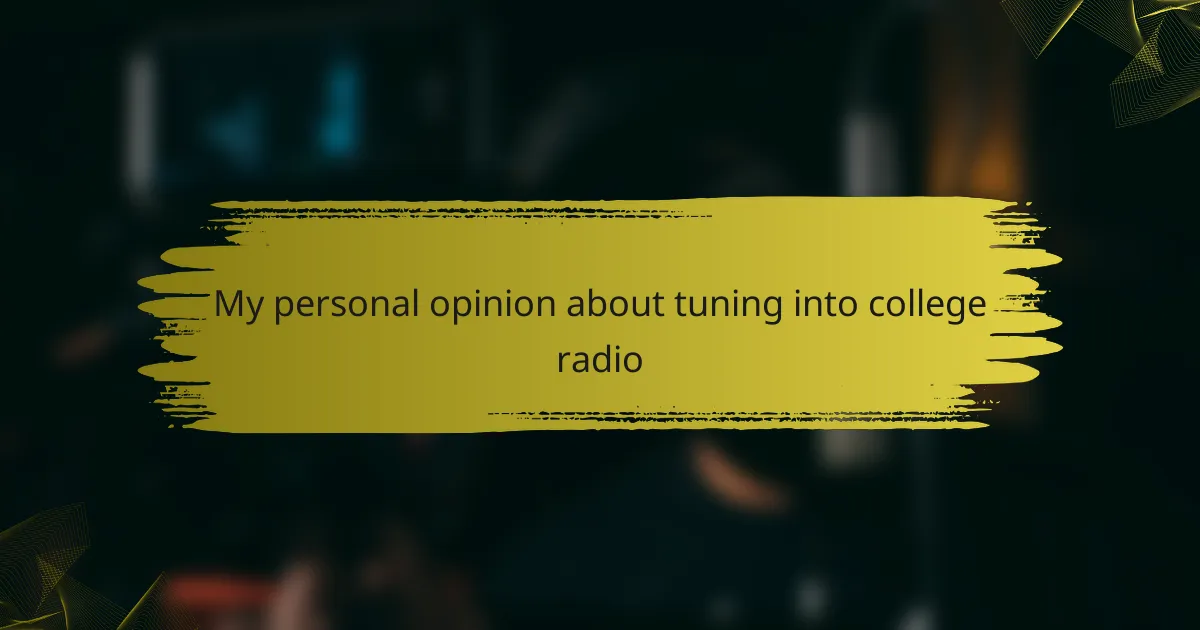Key takeaways
- College radio promotes creativity and diversity, providing a platform for emerging artists and unique programming.
- It serves as an important community resource, engaging listeners with local issues and fostering a sense of belonging.
- Independent media, like college radio, plays a crucial role in offering alternative perspectives compared to mainstream outlets.
- The future of college radio is bright as it adapts to digital platforms, expanding its reach and relevance in the media landscape.
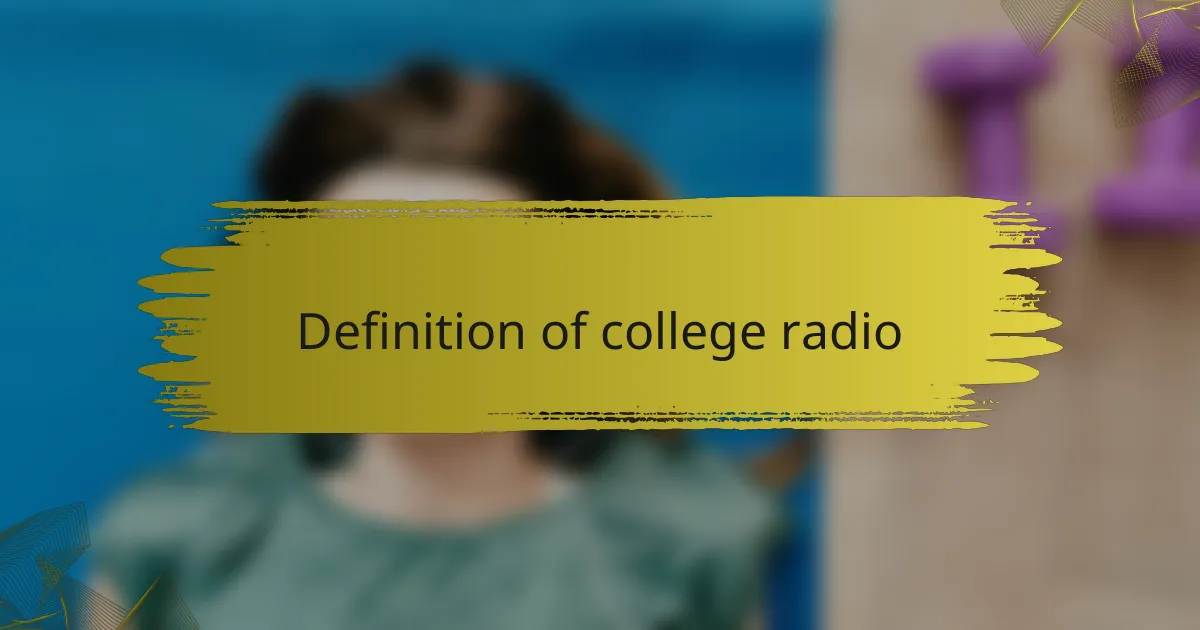
Definition of college radio
College radio refers to non-commercial radio stations operated by colleges and universities, typically serving as a platform for students to express themselves through music, talk shows, and various programming. I remember my first experience tuning into a college station while studying, and the eclectic mix of genres made me feel connected to a community of fellow music lovers.
These stations are often run by students and provide a unique avenue for creativity and experimentation, allowing budding DJs and hosts to showcase their talents. Have you ever found a hidden gem of a song on a college radio station? It can feel exhilarating to discover new artists and voices that mainstream media often overlooks.
Moreover, college radio plays a crucial role in promoting local talent and providing a space for important discussions on campus and beyond. I believe that engaging with college radio can enrich your understanding of culture and community, making it not only an entertainment source but also a vital part of the broadcasting landscape.
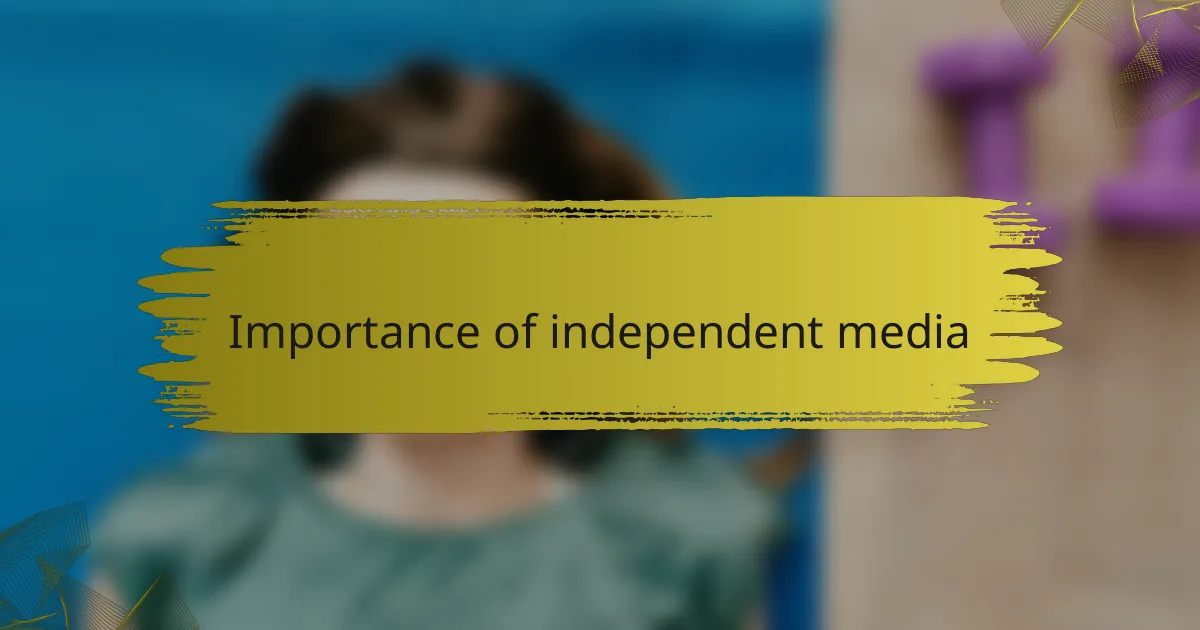
Importance of independent media
Independent media serves as a vital counterbalance to mainstream outlets, often providing diverse perspectives and niche content that might otherwise go unheard. For me, tuning into independent radio has often felt like opening a door to conversations that challenge the status quo. Have you ever noticed how independent stations highlight local stories and issues that affect your community directly? They give a voice to the unheard, which is something truly powerful.
Additionally, independent media fosters creativity and innovation in broadcasting. I recall discovering a local college radio show that featured interviews with emerging artists, something you just don’t find on commercial stations. It expands our musical and cultural horizons, encouraging us to explore beyond the conventional. This connection to independent content often leads to personal growth and a broader understanding of the world around us.
Moreover, independent media cultivates an engaged audience that values authenticity over sensationalism. When I listen to a program that reflects genuine passion, it resonates on a deeper level. It makes me feel part of a community that prioritizes meaningful dialogue and creativity. Isn’t it refreshing to know that there are platforms dedicated to promoting truth rather than just ratings? Such engagement can be transformative, shaping not only how we consume content but also how we see ourselves within the larger narrative.

Benefits of tuning into college radio
Tuning into college radio offers a fresh perspective on music and culture that mainstream outlets often overlook. I remember discovering hidden gems and local bands I wouldn’t have found anywhere else, all while feeling a connection to the vibrant college community. The energy and passion of student DJs come through in their shows, creating an engaging atmosphere that makes listening feel personal and intimate.
Moreover, college radio serves as a platform for diverse voices and experimental content. It promotes creativity and innovation, allowing students to share ideas and stories that matter to them. Listening often feels like being part of a conversation, where you can explore new genres and social topics that truly resonate with young adults like me.
Here’s a comparison table that highlights specific benefits of tuning into college radio:
| Benefit | Description |
|---|---|
| Diversity of Content | Explores niche genres and local interests often ignored by mainstream media. |
| Community Engagement | Connects listeners with campus life, events, and student initiatives. |
| Creativity and Innovation | Encourages students to experiment with programming and explore new ideas. |
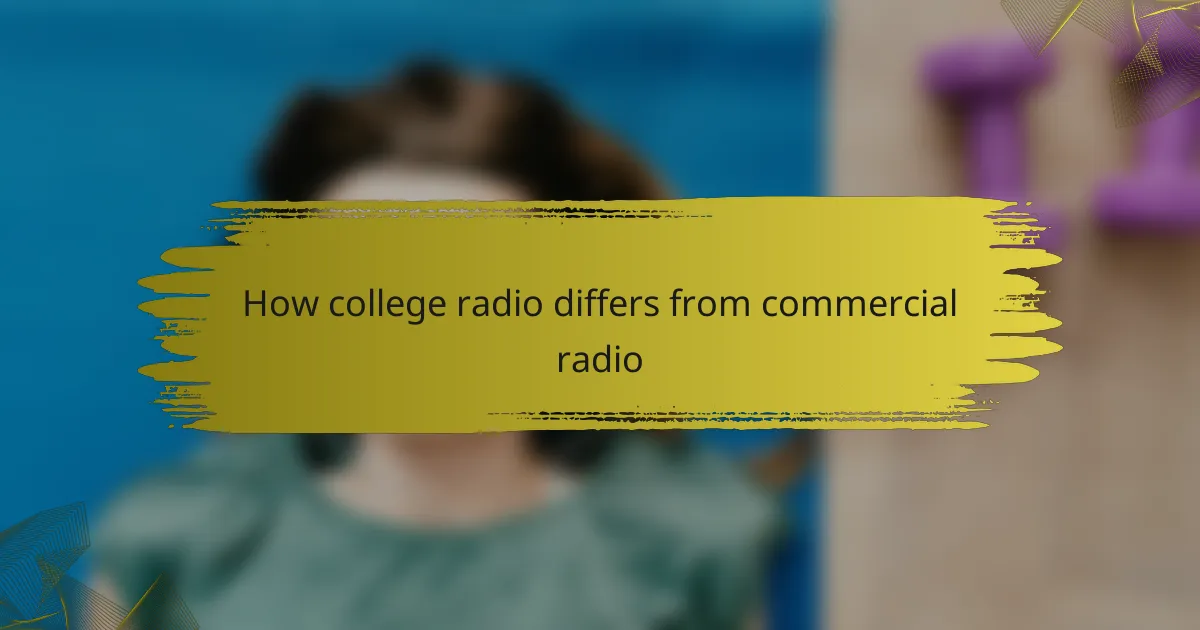
How college radio differs from commercial radio
College radio has its own unique charm that sets it apart from commercial radio. In my experience, college stations often cultivate a more experimental and diverse sound. This openness allows students to explore various genres that might not receive mainstream attention, creating an eclectic mix that keeps listeners engaged and excited for what’s next.
What truly makes college radio special is the passion behind each broadcast. Student DJs aren’t just there to play the hits; they’re sharing music they love, along with personal stories that connect them to the songs. I remember tuning into my college radio station and discovering incredible artists whom I would probably never have heard on commercial airwaves. This genuine enthusiasm often translates into more meaningful conversations around the music and the culture surrounding it.
- College radio is student-run, showcasing emerging talent and new voices.
- Programming often includes niche genres and local artists that commercial stations might overlook.
- There’s less pressure to adhere to advertising schedules and ratings, allowing for creative freedom.
- College DJs often engage directly with their audience, fostering a sense of community and shared experience.
- Many college stations host live events and concerts, creating deeper connections between artists and listeners.
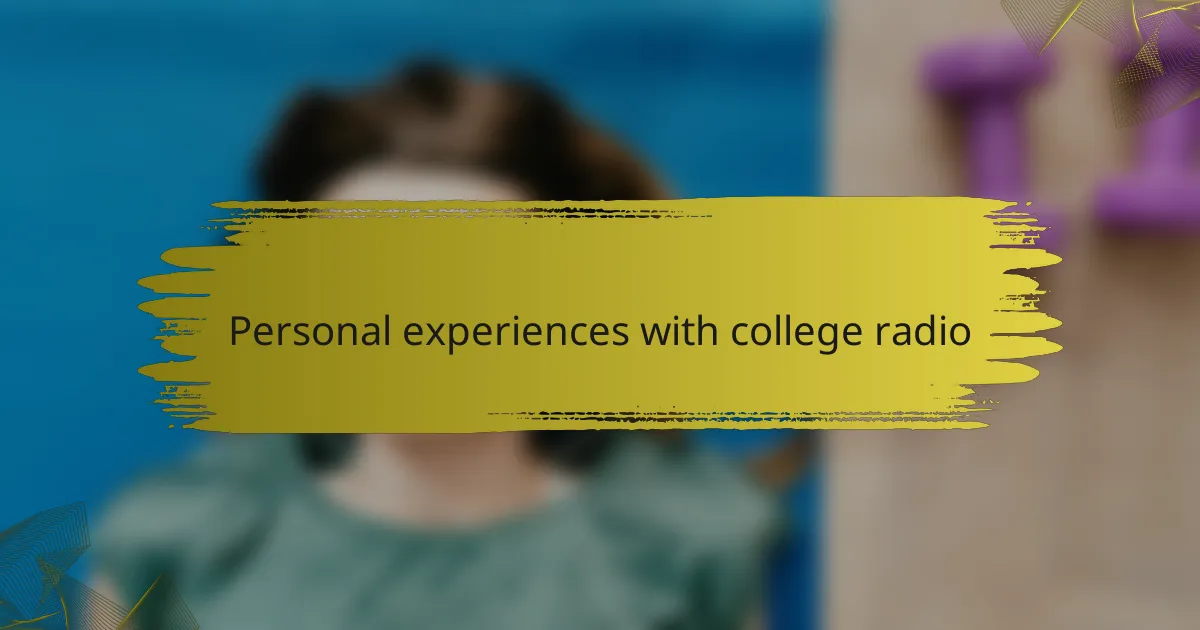
Personal experiences with college radio
During my time in college, tuning into the college radio station was more than just listening to music; it became a ritual that shaped my daily routine. I remember those evenings driving home, the sun setting and an eclectic mix of local bands and indie artists filling my car. There was something beautifully raw about hearing a band’s first track or discovering an artist before they hit it big—the thrill of being part of something authentic and emerging.
I’ve had the pleasure of connecting with passionate hosts who would share their personal stories and inspirations behind the music played. This intimate dialogue made me feel like I was part of a creative community, even if I was just a listener. It allowed me to experience the soul of college life, where every playlist felt like a curated journey through the artistic expressions of my peers.
- Discovering hidden gems: I stumbled upon songs that became lifelong favorites, all thanks to enthusiastic DJs.
- Building a community: I felt a sense of belonging, connecting with others who shared a love for unique sounds.
- Emotional highs and lows: The music reflected my experiences, making those college years even more memorable.
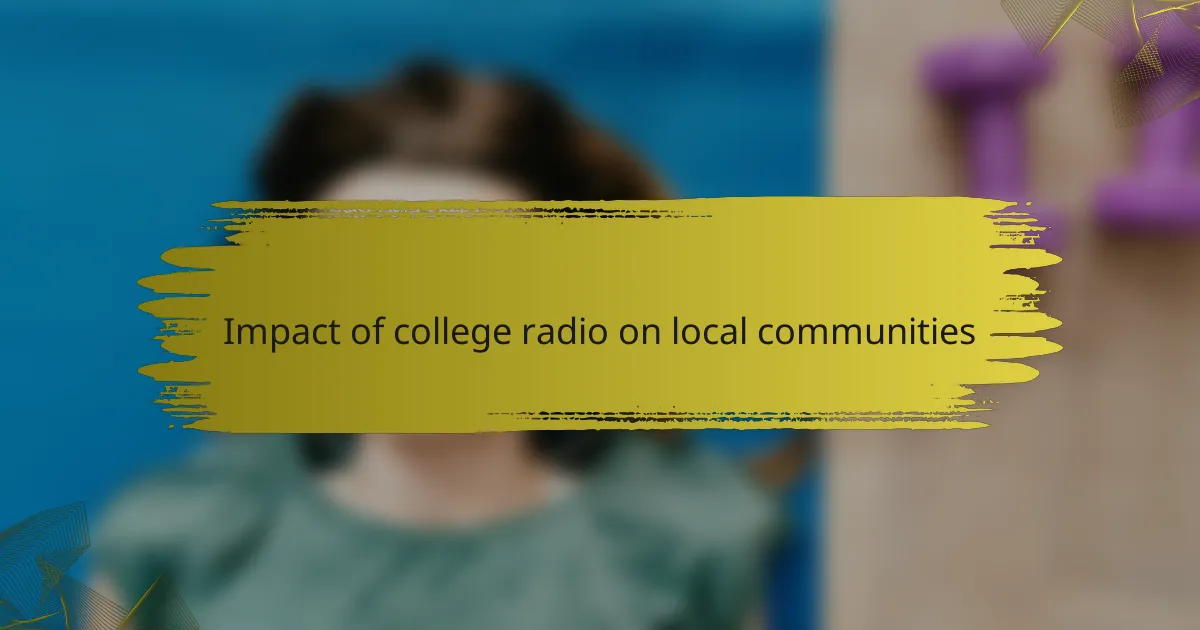
Impact of college radio on local communities
College radio plays a vital role in shaping local communities, often serving as a platform for diverse voices that might otherwise go unheard. From my experience, these stations not only broadcast music and news but also engage students and local residents in issues that matter to them. I remember tuning in to my college radio station and hearing discussions about community events; it made me feel connected to the place I called home.
Moreover, college radio fosters creativity and innovation. By providing a space for students to experiment with programming and sound, it cultivates a unique blend of talent and passion. I often found myself discovering new bands and artists that I wouldn’t have encountered elsewhere, and that sense of discovery brought a refreshing vibe to my surroundings.
To illustrate the impact of college radio, I’ve prepared a comparison of its benefits versus mainstream radio:
| Aspect | College Radio | Mainstream Radio |
|---|---|---|
| Community Focus | High engagement with local issues | Often less localized content |
| Music Variety | Diverse genres, including local artists | Predominantly popular chart music |
| Listener Interaction | Encourages listener participation | Limited room for audience feedback |
| Creativity | Platform for experimentation | More formulaic programming |
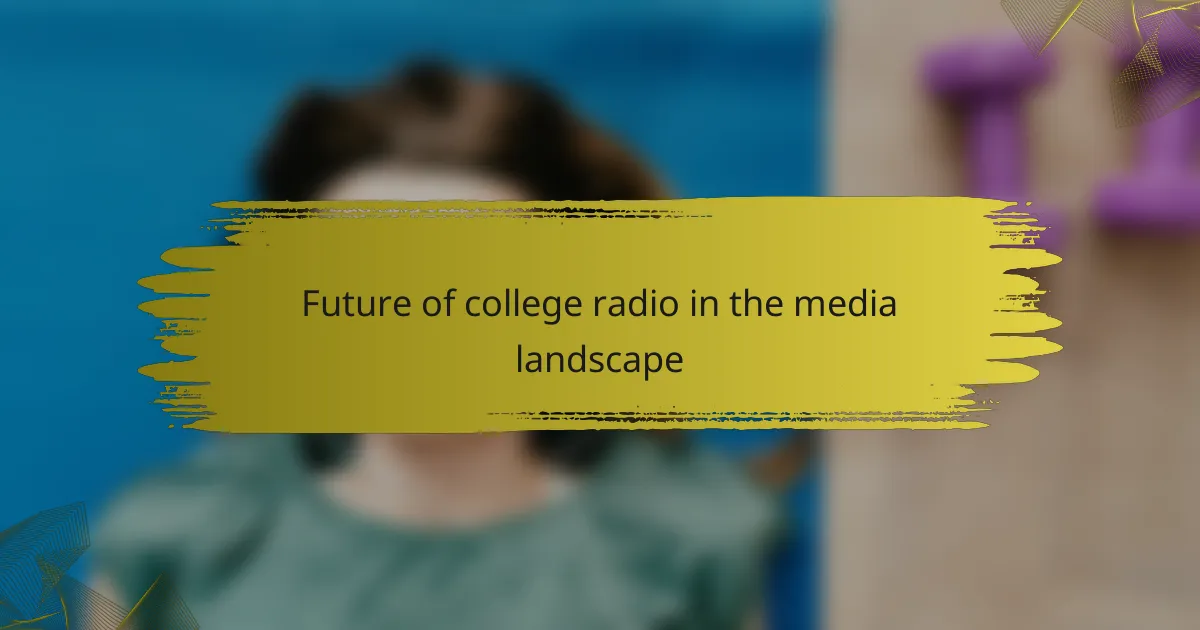
Future of college radio in the media landscape
The future of college radio holds exciting potential as it continues to adapt to an ever-changing media landscape. From my experience, student-run stations are uniquely positioned to embrace digital platforms, which allows them to reach broader audiences than ever before. I remember tuning into my local college station online and discovering independent artists and diverse programming that I never would have found otherwise.
Moreover, the increasing demand for niche and authentic content boosts the relevance of college radio. As traditional media faces challenges, these stations are thriving by offering fresh perspectives and local flavors. I’ve felt that strong sense of community when engaging with not only the students behind the microphones but also the listeners who share their passion for music and ideas.
| Aspects | College Radio |
|---|---|
| Audience Engagement | Highly interactive with local focus |
| Content Diversity | Varied programming appealing to niche interests |
| Adaptability | Rapidly evolving to include digital platforms |
